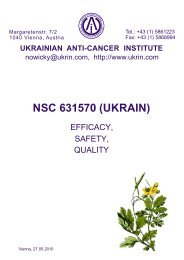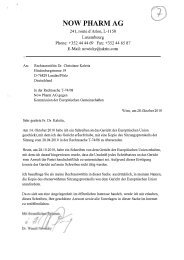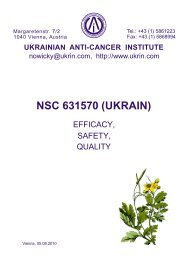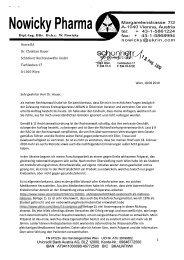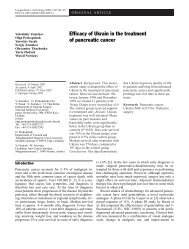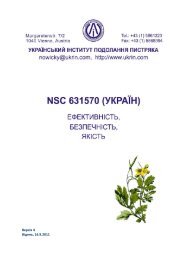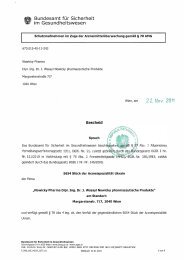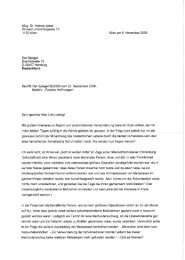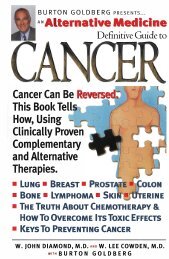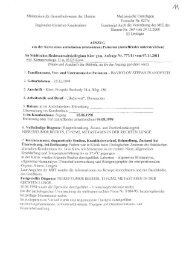Criminal Story of a Prevention - Ukrainian Anti Cancer Institute
Criminal Story of a Prevention - Ukrainian Anti Cancer Institute
Criminal Story of a Prevention - Ukrainian Anti Cancer Institute
Create successful ePaper yourself
Turn your PDF publications into a flip-book with our unique Google optimized e-Paper software.
Pr<strong>of</strong>essor Friedrich Kuffner, who further helped him with his research. In his home<br />
laboratory, Nowicky had a whole collection <strong>of</strong> alkaloids.<br />
One day as he returned home he found his flat door had been forced and the police,<br />
who had been called by a neighbour, in his flat. Everything had been stolen. The thief was<br />
never found.<br />
However, once in a while there were also rays <strong>of</strong> hope. One <strong>of</strong> these came from the<br />
Ministry <strong>of</strong> Trade where the head <strong>of</strong> the research department, Dr. Norbert Rozsenich, became<br />
aware <strong>of</strong> this ‘student’. He supported his work with a commission worth € 22,000, which<br />
came to Nowicky via Pr<strong>of</strong>essor Kuffner for further research into greater celandine alkaloids.<br />
Nevertheless, there was also resistance at the <strong>Institute</strong> <strong>of</strong> Pharmacology. Nowicky was<br />
forbidden to carry out in vitro experiments because, as he found out from a colleague who<br />
wanted to write his thesis on the preparation developed by Nowicky, the Ministry <strong>of</strong> Health<br />
had intervened - despite the fact that it was not responsible for university matters.<br />
Then once again he had to leave his laboratory table within two hours without<br />
explanation. He later discovered from the laboratory assistant Walter Oparski that he had been<br />
reported as a spy.<br />
Pr<strong>of</strong>essor Kuffner, who obviously did not have the power to retain his talented<br />
protégé, found a place for him with Pr<strong>of</strong>essor Bancher, a botanist, at the Technical Academy,<br />
where he was able to work for a while before he was once again sent away from the<br />
laboratory without explanation.<br />
During this period, the pharmaceutical company La Roche <strong>of</strong>fered him space at their<br />
Vienna laboratory. However, Nowicky was not prepared to accept the condition that<br />
everything he discovered there would belong to La Roche.<br />
Nowicky could not explain the continuous harassment to which he was subjected. He<br />
thought back in vain, looking for connections. The only thing he could think <strong>of</strong> was about the<br />
time when his difficulties had begun. That was very soon after his arrival in Vienna. The<br />
Chancellor had not only put him in touch with Wrba, but also with the Minister <strong>of</strong> Health,<br />
Ingrid Leodolter. In 1976 there had been a meeting at the ministry where, besides Nowicky<br />
and the minister, a civil servant from the registration department and the doctor, Pr<strong>of</strong>essor<br />
Karer, who carried out clinical studies for the pharmaceutical industry, were present. The<br />
subject <strong>of</strong> the discussion was Nowicky’s ‘discovery’.<br />
Karer had said that Nowicky’s patent was ‘nothing special’ and that it was not worth<br />
undertaking further work on the drug. ‘That’s <strong>of</strong> no interest,’ he said, as Nowicky still irately<br />
remembers – and that he flared up.<br />
‘How can you say that when my substance is three hundred times less toxic than<br />
normal cytostatica?’<br />
At that time, Walter Hiesmayr had already tested the substance, which Nowicky had<br />
named after his home country ‘Ukrain’, in vitro and on rats and mice and also discovered its<br />
fluorescence.<br />
The Minister <strong>of</strong> Health did not appear impressed by any <strong>of</strong> this, she merely wanted to<br />
calm everybody down. ‘Gentlemen, please stop arguing.’ And that is as far as it went.<br />
Immediately afterwards, Nowicky was forced to leave his first laboratory. His<br />
brooding led him to the conclusion that it was the Ministry <strong>of</strong> Health, <strong>of</strong> all places, that had<br />
begun placing obstacles in the way <strong>of</strong> his work. If this was true, the auspices were extremely<br />
depressing. Nowicky was deeply discouraged.<br />
To take his mind <strong>of</strong>f all this, he booked a cheap bus trip to Paris for Easter. On Easter<br />
Sunday he was walking through town visiting churches. That year the Catholic and Orthodox<br />
Easters fell on the same day. Nowicky was a member <strong>of</strong> the United Church. He stayed for a<br />
mass in Notre Dame and then wandered through Saint Germain. From the church <strong>of</strong> Saint<br />
Germain he suddenly heard <strong>Ukrainian</strong> singing, went in and stayed until the end <strong>of</strong> the service.<br />
A woman spoke to him and invited him, as was the tradition, to an Easter meal with many<br />
13



